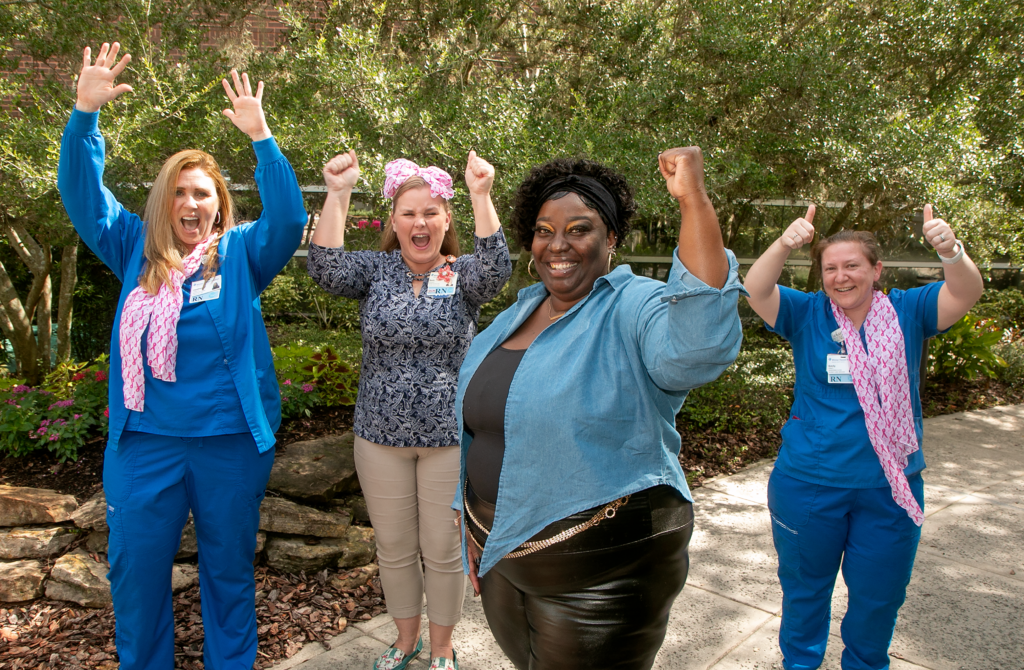Breast Cancer Patient Discusses the Lessons Her Journey Has Taught Her
story by TIM CRAIG
photos by MICHAEL WILSON
Three truths have become readily apparent to Cyntrena Gregory over the past 11 months.
Gregory, from Winter Haven, first felt a slight lump in her breast in late 2020, but didn’t really take serious note of it.
“I had an inclination that something was there, but I didn’t feel any dimpling or anything else, so, really, I didn’t take it too seriously,” she says. “And with the pandemic going on, I just didn’t really want to go into a doctor’s office.”
This is when the first truth became apparent: If you have any doubts, get it checked out.
Her annual physical was coming up, so she decided to go. She told her doctor about the lump and scheduled a mammogram. At the ultrasound appointment, things began to turn.
“I went into the appointment thinking it was probably just some fatty tissue or a cyst,” she says. “But on that day, I just knew that it didn’t look good, and it freaked me out. I immediately thought the worst.”
Gregory went to her doctor, Dr. Paul Williams in Davenport. After looking at the X-rays and test results, he immediately ordered a biopsy. When the results came back, Gregory’s fears were confirmed: Stage 2 breast cancer.
“I was like, ‘What is all this?’ says the 41-year-old mother of two. “Am I going to die? What about my kids? My family?
Williams talked her through the process. He assured her that the cancer was treatable and curable. He also made one other point clear: “He said, ‘You’d better get ready because I’m going to come at you like a Mack truck to treat this thing.”
And that’s when the second thing became readily apparent: Mental fortitude is key.
“I’m a fighter and a competitor, so when he told me that, I knew I had to be ready,” Gregory says. “I knew that I couldn’t let him or this disease get the best of me.”
To make it easier for her to get treatments, Williams suggested consulting oncologist Dr. Hassam M. Ebrahim in Winter Haven at the beginning of March. For the rest of that month, checkups and chemotherapy preparations, Gregory was getting mentally prepared.
“By the time I started chemotherapy in late March, I was at peace with the whole thing,” she says. “I had the push and the drive, but I also had the support and prayers from my family and friends; so I was ready.”
Within that readiness, the third truth became apparent: The importance of a support network.
“I took two different medications, the first looked like a red juice, but it definitely was not a red juice,” she says, laughing. “That threw me for a loop.”
Gregory had four treatments of that medication, Doxorubicin, which can be difficult for the patient.
“It was definitely not for the weak, it drove me to my limits,” she says. “I was trying to continue to work, but all I wanted to do was to sleep.”
Her second treatment was Paclitaxel, which she took once a week for 12 weeks, with her final dose on August 3. Compared to the first treatment, this one went much better.
“By the grace of God, I had no symptoms; it was a smooth ride,” she says. “And I was fortunate that every week, I had a member of my family with me at the treatment. Beyond that, though, since no one in my family had ever had breast cancer, there were co-workers and other people who were able to come along beside me and answer questions. The support I found was tremendous.”
The support didn’t just come from family and friends. Gregory found the nursing staff and her doctors were more than willing to provide support, care and answers.
“The treatment nurses in Winter Haven were excellent,” she says. “They were a driving force for me, always welcoming me, always encouraging me and lifting me up if it wasn’t a good day. Dr. Williams, as well, was excellent. His bedside manner was so calming that it helps you feel like you’re going to get through.”
Gregory’s journey is continuing. In early September, she had a lumpectomy and she is waiting to hear what her next steps should be, including any additional radiation treatments. But even with more treatment looming, she knows she’s ready.
“The first thing people need to do is get checked out,” she says. “Then you need to maintain a strong mindset and rely on the community around you. Whether it is family or friends or whoever, there is a community that is rooting for you and willing to give you support. Find that and rely on it.”
